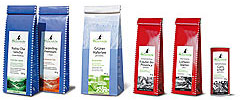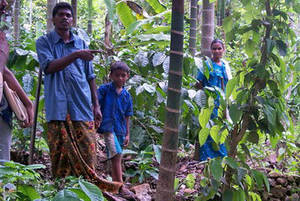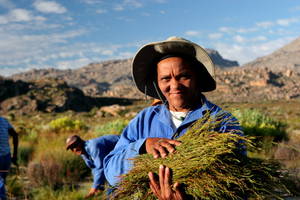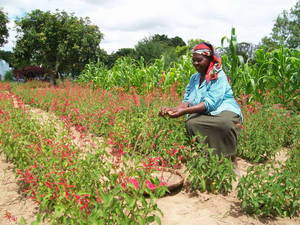Kommunikations - und
Netzwerk - Initiative
"Trust Organic Small
Farmers". Seit 2007.
Weltwirtschaft und ethisches Handeln
Brennend aktuelle Themen in der Wirtschaft sind ethisches und faires Handeln, globale Gerechtigkeit, Umwelt- und Klimaschutz. In der momentanen Finanz- und Wirtschaftskrise wird wie in einem Röntgenbild offensichtlich, dass Armut, Verelendung, Hunger, Umwelt- und Klimaschäden mit dem (vorübergehenden?) Reichtum in den westlichen Breiten einhergehen.
Wie bekommt man nachhaltig und auf gerechte Weise die Menschheit satt? Die einen Wissenschaftler meinen, durch Agroindustrie und Gentechnik - die anderen sehen die Zukunft nur nachhaltig durch kleinteilige Strukturen gesichert: Schutz der traditionellen Landwirtschaft, sprich Förderung von Kleinbauernprojekten auf der ganzen Welt, biologischer Landbau, Schutz der traditionellen sozialen Gesellschaften.
Communications - and
Network - Initiative
"Trust Organic Small
Farmers". Since 2007.
World economy and ethical action
Burning current issues in the economy are ethical and fair trade, global justice, environmental and climate protection. In the recent financial and economic crisis, it becomes apparent as in an X-ray, that poverty, deprivation, hunger, environmental and climate damage go alongside with the (temporary?) wealth of the Western (consumer) societies.
How do you get the entire mankind to adopt sustainable and fair path so that you can feed the whole world and no one goes hungry? Some scientists think, through agro-industry and genetic engineering - others see the future only by sustaining small-scale structures : protection of traditional agriculture, i.e. promotion of small farming projects around the world, organic farming, and protection of traditional social societies.
Bio und fair
Als die Naturkostbewegung in den 70er Jahren begann, war politisch und sozial verantwortliches Handeln fester Bestandteil der Idee. Mit dem Einstieg "normaler" Konzerne in das Bio-Geschäft hielten natürlich auch konventionelle Strategien Einzug. Gleichzeitig entstanden Fairtrade-Bewegungen, klassischerweise zunächst zur Unterstützung von großen Kooperativen mit Monoprodukten wie Kaffee, Kakao und Bananen. Fairtrade-Produkte stammten anfangs hauptsächliche aus konventioneller Landwirtschaft. Erst seit ein paar Jahren wachsen die Ideale "Bio" und "Fairtrade" wieder zusammen.
Was bringt der faire Handel
Zunächst: der "Faire Handel" ist ein westliches Konstrukt. Denn warum sollte ein Bauer erst billig verkaufen, dann jährlich eine Gebühr bezahlen für die Fair-Zertifizierung, und dann auf einen gerade kostendeckenden Preis eine "Spende" bekommen wollen?
Die Profilierung mit Fair-Handels-Strategien dient auch dem Marketing: zur Zeit werden allgemein in der Wirtschaft, neben den vorhandenen Fair-Siegelsystemen, recht schnell neue Siegel aller Art aus dem Boden gestampft, um den Umwelt- und Ethikaspekt wieder ins Blickfeld zu bringen. Alle Siegelsysteme bringen aber als Nebeneffekt hohe Verwaltungs- und Zertifizierungskosten mit sich. Das ist für Großunternehmen leichter zu stemmen als für kleine, spezialisierte Unternehmen und Anbauer, die typischerweise mit kleinen Chargen und vielen Produkten arbeiten. Kleinbauern-Projekte, die um die 2000 Familien mit je 1ha Land betreuen, wie die NGO PDS in Indien und SOFA in Sri Lanka, sind zwar Transfair-zertifiziert, haben jedoch wegen aufwendigerer Organisation und hohen Zertifizierungskosten geringere Marktchancen als Großfarmen.
Bio-Kleinbauernprojekte schaffen Werte
Bei ökologischen Kleinbauernprojekten wird durch die kleineren Strukturen und Feldeinheiten das traditionelle soziale Gefüge erhalten, und aktiv Landschaftsschutz betrieben. Durch eigene Forschungen und Schulungen der Kleinbauern wird diese ursprüngliche Art der Agrarwirtschaft zukunftsfähig gemacht und sichert den Familien den Lebensunterhalt. Dem typischen Phänomen Landflucht wird so vorgebeugt. Der Erhalt der ursprünglichen Landschaften und die schonende, nachhaltige Bewirtschaftung schützen auch in den Industrieländern das Klima. Gerade Kleinbauernprojekte pflegen eine reiche Biodiversität.
Beispiel Kannampady, Tribal-Gewürz-Projekt
Die Industrialisierung hat überall in der Welt immer eher negative Folgen für die indigenen Bevölkerungen und deren Kultur gehabt als Vorteile gebracht. Die Ureinwohner sind ihrer traditionellen Lebensbedingungen, die sie seit Jahrhunderten gepflegt haben, beraubt worden, unter dem Druck, sich dem "modernen" Leben anzupassen. Landraub zugunsten der Industriegesellschaften ist immer noch an der Tagesordnung.
Kannampady ist eine Adivasi-Niederlassung inmitten des Urwalds. Dort leben z.B. Kleinbauernfamilien der Urali - und Ulladan Stämme. Eine große Anzahl der Bauern produziert auf durchschnittlich 1 ha biozertifizierter Fläche Gewürze als Cash Crop und Früchte zur Selbstversorgung. Eine Vielfalt an Sorten auf einem Flecken, der für Laien nur undurchdringlich grün aussieht, eben Dschungel. Sie gehören zum Kleinbauern-Consortium Sahyadri-Spice-Farmers, das von der NGO Peermade Development Society gegründet wurde. Die PDS hat sich entschlossen, die Gewürze des Kannampady-Projekts getrennt mit genauer Herkunftsbezeichnung unter dem Aspekt des Tribal-Projekts zu vermarkten, um mehr Aufmerksamkeit für die Situation der Adivasi zu erreichen.
Im Jahr 1980 wurde die Gesellschaft Peermade Development Society (PDS) durch Bischof Mathew Arackal der katholischen Diözese Kanjirapally gegründet. Aufgabe ist ländliche Entwicklung, d.h. Verbesserung der Lebensbedingungen für die arme ländliche Bevölkerung, mit Programmen und Projekten für benachteiligte, marginalisierte Stämme, verarmte Kleinbauern, Frauen und Kinder. Die Arbeit beinhaltet neben dem Aufbau von kommunalem Gesundheitswesen, Gemeindeorganisation und Umwelt-Management auch die Vermarktung einheimischer Medizinalpflanzen, die Förderung des ökologischen Landbaus und einen eigenen Gewürz- und Teeexport der Kleinbauerngemeinschaft. Seit 2010 sind die Kleinbauern im Sahyadri Spice Farmers' Consortium unabhängig von der Verarbeitungs- und Exportfirma PDS Organic Spices organisiert.
Willkommen bei KAITE, Simbabwe
Die Initiative: Um den Menschen in Simbabwe ein würdevolles Leben zu ermöglichen, ist es notwendig, dauerhaft tragfähige Strukturen zu schaffen. Die KAITE-Initiative hat zum Ziel, Kleinbauern in Zimbabwe nachhaltig sozial und ökonomisch zu stärken. Sie steht auf zwei Säulen. KAITE ist zum einen Unternehmen, das den Anbau und die Weiterverarbeitung hochwertiger Bio-Produkte für den lokalen und internationalen Markt zum Ziel hat und dabei den Grundsätzen nachhaltiger Unternehmensführung folgt. Zum anderen umfasst die Initiative einen gemeinnützigen Verein, der sich im sozialen Bereich und der Gesundheitsversorgung engagiert.
Das Unternehmen: KAITE fördert die Produktion Kräuter, Gewürze sowie ätherischer Öle aus Duftpflanzen. Die benötigten Pflanzen werden von den angeschlossenen Kleinbauern auf ihren Feldern angebaut und im Rahmen der Initiative sofort verarbeitet. Das Unternehmen sichert die weltweite Vermarktung zu fairen Bedingungen für die Bauern. Damit ist die Voraussetzung für eine eigene, von Entwicklungshilfe unabhängige Zukunft geschaffen.
Das Unternehmen beliefert den internationalen Markt für biologische ätherische Öle, Aromaöle und Medizinalpflanzen direkt aus Simbabwe.
Wupperthal Original Rooibos Cooperative
Der Name Wupperthal stammt von Missionaren der Rheinischen (Gottlieb Leipoldt) Mission, die im 19.Jh. von der Wupper nach Südafrika gingen, und in dem Tal am Fuß der Cederberge / Kap-Provinz in West-Südafrika (ca. 270km nördlich von Kapstadt) im Jahr 1829 eine Station gründeten. Sie missionierten und förderten aber auch Landbau und Handwerk bei den einheimischen schwarzen bzw. farbigen Bevölkerungsgruppen. Die Mission kaufte Land auf und stellte es den Kleinbauern zur Verfügung. Nach dem Ende der Sklaverei (1834) wurde die Wupperthaler Missionsstätte zur Zuflucht, und viele der einheimischen Khoi San - People nahmen dann den neuen Glauben an. Heute gehört Wupperthal zur Moravian- (Herrnhuter-) Church und ist ein schmuckes Dorf mit strohgedeckten Häuschen in einem lieblichen Tal, mit durchfließendem Flüsschen und schattigen Bäumen.
Die biozertifizierte Wupperthal Original-Rooibos Cooperative wurde am 3. August 2009 von 84 Mitgliederfamilien gegründet, die bereits seit 1998 Rooibos Tee hergestellt haben. Rooibos war bisher die einzige Einnahmequelle, doch nun haben einige der Mitglieder begonnen, weitere Bio-Kräuter anzubauen.
Unsere Mitglieder arbeiten eng zusammen und unterstützen sich gegenseitig bei der Entwicklung von Kapazitäten, Qualitätssicherung und der Vermarktung der Erzeugnisse.
Willkommen bei SOFA, Sri Lanka
1993 gründete Dr. Sarath Ranaweera eine Verarbeitungs- und Vermarktungsfirma für fair gehandelte und ökologisch angebaute Produkte von Kleinbauern, die Firma BIO FOODS.
Die angeschlossenen Kleinbauern sind seit 2002 selbstständig organisiert in der SMALL ORGANIC FARMERS ASSOCIATION (SOFA) unter dem aktuellen Präsident Bernard Ranaweera.
SOFA ist eine 100% selbständige Kleinbauern-Organisation, die von einem Vorstand, bestehend aus den Präsidenten/Vertretern von 46 Zweiggesellschaften mit insgesamt mehr als 2000 Bio-Kleinbauern verwaltet wird. Unsere Organisation ist auf die Herstellung von Tee, Gewürzen, Kräutern, Kokos etc. nach internationalen Bio-Standards spezialisiert. Gegenüber Plantagenwirtschaft steht in vielen Bereichen eine höhere Qualität der Kleinbauern-Produkte: die nachhaltige Bewirtschaftung von kleineren Feldeinheiten in ihrer natürlichen (Wald-) Umgebung ist aktiver Umweltschutz, der dem gesamten Erdklima zugute kommt. Es werden alte Pflanzensorten gepflegt und neue Sorten, die optimal zu den Standorten passen, erprobt. Die Biodiversität - das Pflegen einer hohen Anzahl verschiedenster Pflanzen - trägt bei zur Erhaltung des Artenreichtums der Erde. Die traditionellen sozialen Strukturen bleiben erhalten, die Familien bleiben zusammen und selbständig, erzielen in Zusammenarbeit mit ihrer Verarbeitungs-/ Exportfirma garantierte Mindesteinkommen, und sind sozial abgesichert.
Initiative: Trust Organic Small Farmers
Im Jahr 2007 beauftragte die Firma Topqualitea den Wirtschaftsjournalisten Harald Gruber und den Berater für nachhaltige Entwicklung+Handel Olaf Paulsen mit einer Studie zur Marktsituation benachteiligter kleinbäuerlicher Produzentengruppen und einem Kommunikations-Konzept zur Chancen-Verbesserung. Im Winter 2007 trafen sich dann erstmalig eine Handvoll Kleinbauernprojekte aus Indien, Sri Lanka und Südafrika, sowie Importeure und Händler für Fairtrade- und Bio-Produkte aus Europa, Kanada und USA. Hieraus entstand die Kommunikations- und Netzwerk-Initiative "Trust Organic Small Farmers" - die ersten Jahre unter dem Dach der Comundialis Stiftung Köln, seit 2011 selbständig von den Mitgliedern geführt. Es ist hauptsächlich eine Plattform des Austauschs, Beratung und Vernetzung zwischen Bio-Kleinbauernprojekten (z.Zt. aus Südafrika, Indien, Sri Lanka und Zimbabwe), und Bio-Importeuren / -Händlern aus Europa, USA und Kanada. In ihrer offenen, vertrauten und lösungsorientierten Form ist diese Vernetzung einzigartig. Die Früchte dieser Zusammenarbeit sollen neben Verbesserungen für die einzelnen Projekte ebenfalls eine anschauliche und transparente Kommunikation zu EndverbraucherInnen sein.
Members of producers Trust Organic Small Farmers:
>Sahyadri Organic Small Farmers Consortium / Peermade Development Society, Kerala, India. www.pdsorganicspices.com
>SOFA - Small Organic Farmers Association, Kandy,
Sri Lanka; www.sofasl.org
>Wupperthal Original Rooibos Coop, Wupperthal, South Africa, siehe Lieferantenportrait
>KAITE, Harare, Zimbabwe; www.Kaite.biz
Organic and fair
When the organic movement began in the 1970s, politically and socially responsible action was an integral part of the idea. With the entry of more 'normal' companies into the organic business, conventional strategies naturally got introduced. The Fair Trade movement emerged simultaneously, initially to support large cooperatives with single products like coffee, cocoa and bananas. Fair trade products were in the beginning mainly from conventional agriculture. It is only couple of years since the ideal "Organic" and "Fair Trade" started to come together.
What are the benefits of fair trade
The concept of Fairtrade is a Western consumer idea with a strong marketing focus. The small farmers who should be the beneficiaries of the fair-trade concept often feel that the only impact for them is to pay inspection, license fees and sell at such a low price that they are forced to ask for donations from organisations attached to fair-trade movement. It looks to them like that the marketing aspect and the logo is more important than the implementation of the real objectives of fair-trade.
TOSF does not want `just another label` but bring back to centre of all actions the real and good ethical and environmental aspects of the fairtrade movement.
All certification systems but entail high administration and certification costs as a side effect. Growth is easier for large firms to achieve than for small, specialized companies and growers, who typically work with small lots and lots of products. Smallholders projects that serve about 2000 families, each with 1 ha of land, such as the NGO PDS in India and SOFA in Sri Lanka, although TransFair certified, have fewer market oppor-tunities than large plantation projects due to complicated organization rules and high certification costs.
Organic smallholder projects create value
In the organic small holder projects, the traditional social structure is maintained by the smaller structures and field units, and the landscape actively protected. Through farm level researches and training of small farmers, this original kind of agriculture will be made sustainable for the future and provides the livelihood for the families.
The typical phenomenon of rural exodus is thus prevented . Preservation of the original landscapes and the friendly, sustainable management of agricultural land helps to protect the climate in industrialised countries too. Small farming projects especially, helps maintain a rich biodiversity.
Kannampady example, Tribal Spice Project
Industrialization has had everywhere in the world, more negative effects than benefits on the indigenous people and their aboriginal culture. The natives have been deprived of their traditional living conditions, which they maintained for centuries, under pressure to adapt to the 'modern' life. Land grabbing in favour of industrial societies is still on the agenda.
Kannampady is an Adivasi tribal settlement in the midst of the jungle. There live for example smallholder farming families belonging to the Urali - and Ulladan tribe. Here a large number of farmers are cultivating on an average 1 ha certified organic spices as a cash crop and fruits to feed themselves. . A variety of crops on a patch of land that looks lush green appears to be just an impenetrable jungle to a layman. They belong to the small-scale farmers Consortium Sahyadri-spice farmers founded by the NGO Peermade. PDS has decided to market the spices of the Kannampady project as a distinct origin of supply to achieve more visibility for the situation of the Adivasi under the tribal project.
The non governmental organization Peermade Development Society (PDS) was founded in the year 1980 by Bishop Mar Mathew Arackal. PDS aims at the sustainable development of the tribals, rural poor, marginal farmers, women and children through developing various indigenous, community based and people participatory developmental programmes.
Welcome to KAITE
KAITE contributes to the increased prosperity of Zimbabwe and its people through innovative organic farming and sustainable entrepreneurship with small-scale producers, particularly women. Through our emphasis on the internationally certified (UEBT, fair trade, organic) production of herbs, spices, medicinal and aromatic plants, we ensure that small-scale producers escape the vicious cycle of reliance on imported inputs, unsustainable methods of farming, volatile produce markets, low producer prices, and lack of marketing.
We employ value-adding methods of production and processing, and assist over 2500 participating small-scale farmers and wild collectors with training in organic agriculture and certification, as well as linking them to international fair trade markets.
In the Shona language of Zimbabwe, KAITE means 'a task to be conscientiously fulfilled'. In this way, KAITE places a keen emphasis on social investment, which clearly sets it apart from other traditional companies in Zimbabwe. We recognize that financial security alone is not the answer: the best way to ensure continual economic growth is also to enhance lasting social structures within the communities involved.
Hence, KAITE not only trains its partner farmers in organic agriculture and certification, but is also actively involved in HIV and AIDS treatment and counselling, schooling and orphan care for the participant farming communities.
Wupperthal Original Rooibos Cooperative
The Wupperthal Original Rooibos Cooperative was founded on 3 August 2009 by 84 members who were previously involved in producing Rooibos tea since 1998. They only rely on Rooibos as their source of income. Now some of the members have also started doing organic herbs in order to supplement their income from the Rooibos.
Our members are working together closely and support each other in capacity development, skills training and marketing their produce under their own brand.
Wupperthal is a most attractive oasis in a very rugged wilderness. This picturesque place bas been a Moravian mission station since 1965, although its origins are actually Rhenish. The name "Wupperthal" derives from the Wupper River in Germany, from where two Rhineland missionaries, Theobald von Wurmb and Johan Gottlieb Leipoldt (grandfather of renowned writer C. Louis Leipoldt) arrived in the Cape in 1829 to spread the word among the indigenous people.
The two missionaries settled among the seven Khoikhoi families in the valley and concentrated on their spiritual up-liftment as well as to encourage farming. The population swelled shortly after slavery was abolished in 1838 and many freed slaves arrived from nearby farms.
The village today consists of an old thatched church, a store, and terraces of neat thatched-roofed little cottages and a meandering street with water flowing in furrows.
Welcome to SOFA, Sri Lanka
In 1993, Dr. Sarath Ranaweera founded the processing and marketing company for fair trade and organically grown products from small farmers, the BIO FOODS.
The smallholders are organized since 2002 independently in the SMALL ORGANIC FARMERS ASSOCIATION (SOFA) under the current president Bernard Ranaweera.
SOFA is a 100% independent farmer organization managed by a Board of Management consisting of Presidents/representatives of 46 branch societies with a total of more than 2000 small organic farmers.
Producers annually elect the members for their respective societies democratically in order to carry out the suggestions and implement the programs forwarded at village level by the small farmers. Office bearers of the SOFA mother organization are annually elected at the General Assembly. SOFA is registered as a Fairtrade farmer organization under the Fairtrade Labeling Organization (FLO) and is strengthened with organic and biodynamic certified primary producers.
Our organization is engaged in producing organic teas, spices, herbs, coconut, paddy, etc. according to international organic standards.
Our farmers work collectively and democratically with transparency while being dedicated to the protection of the environment. As a result, today, SOFA has become a very strong organization in Asia. We continuously develop the educational, agricultural, economic and social standards of our small organic farmers.
Our vision is to establish an environmentally friendly, agriculturally developed, equally treated and economically empowered community.
Our members are a dedicated group of farmers who focus on sustainability of the environment. Practice of organic farming like preserving the bio diversity, non use of agro chemicals and use of organic fertilizers are the main features in our small plots of lands.
Initiative: Trust Organic Small Farmers
In 2007 the company TopQualitea commissioned business journalist Harald Gruber and the consultant on sustainable development+trade Olaf Paulsen to do a study on the market situation of disadvantaged groups of smallholder producers and recommend a communication approach for improving opportunities. In the winter of 2007, a handful of small farming projects in India, Sri Lanka and South Africa, met for the first time, together with importers and distributors for fair trade and organic products from Europe, Canada and the United States. This gave rise to the communication and network initiative "Trust Organic Small Farmers" - functioning the first few years under the umbrella of the Comundialis Foundation of Cologne, but led since 2011 independently run by the members themselves.
It is mainly a platform for exchange, consultation, and networking between small farmers organic projects (currently from South Africa, India, Sri Lanka and Zimbabwe), and organic importers / traders from Europe, United States and Canada. This network is unique in its open, mutual trust based and solution-oriented, form. The fruits of this cooperation are, in addition to improvements for the individual projects, a clear and transparent communication with consumers.
Importers & Suppliers in Trust Organic Small Farmers:
Topqualitea, Freiburg / Germany and Cape Town / ZA .
Heuschrecke, Troisdorf / D
Les Jardins de Gaia, Wittisheim / F
Equal Exchange, UK + USA
Ethiquable, Fleurance / F & Berlin / D
Just us! Coffee, Canada
(as well as friends and guests).
Diese Information haben wir anläßlich einer Präsentation von "Trust Organic Small Farmers" auf der IFOAM session "Social Justice - Do we care?", auf dem BioFach Congress 2013 geschrieben.
Im Prozess des Übersetzens ergaben sich leichte Unterschiede zwischen der deutschen und der englischen Version. Die englische Version ist stärker geprägt durch die Sicht der Produzenten, die deutsche Version durch die Sicht der Importeure und Händler.
Wir haben es so gelassen.
Es lohnt sich, beides zu lesen.
This information we have written on the occasion of a presentation of "Trust Organic Small Farmers" at the IFOAM session "Social Justice - Do we care", at the BioFach Congress 2013th,
In the process of translation, there were slight differences between the German and the English version. The English version is more characterized by the point of view of producers, the German version with the perspective of the traders. We have left it that way.
It is worthwhile to read both.
Kontakt: www.facebook.com/pages/Trust-Organic-Small-Farmers/ .
Ursula Stübner, Heinz-Dieter Gasper, Benedikt Kaukler, Sunil Joseph Muricken






Schreibe einen Kommentar